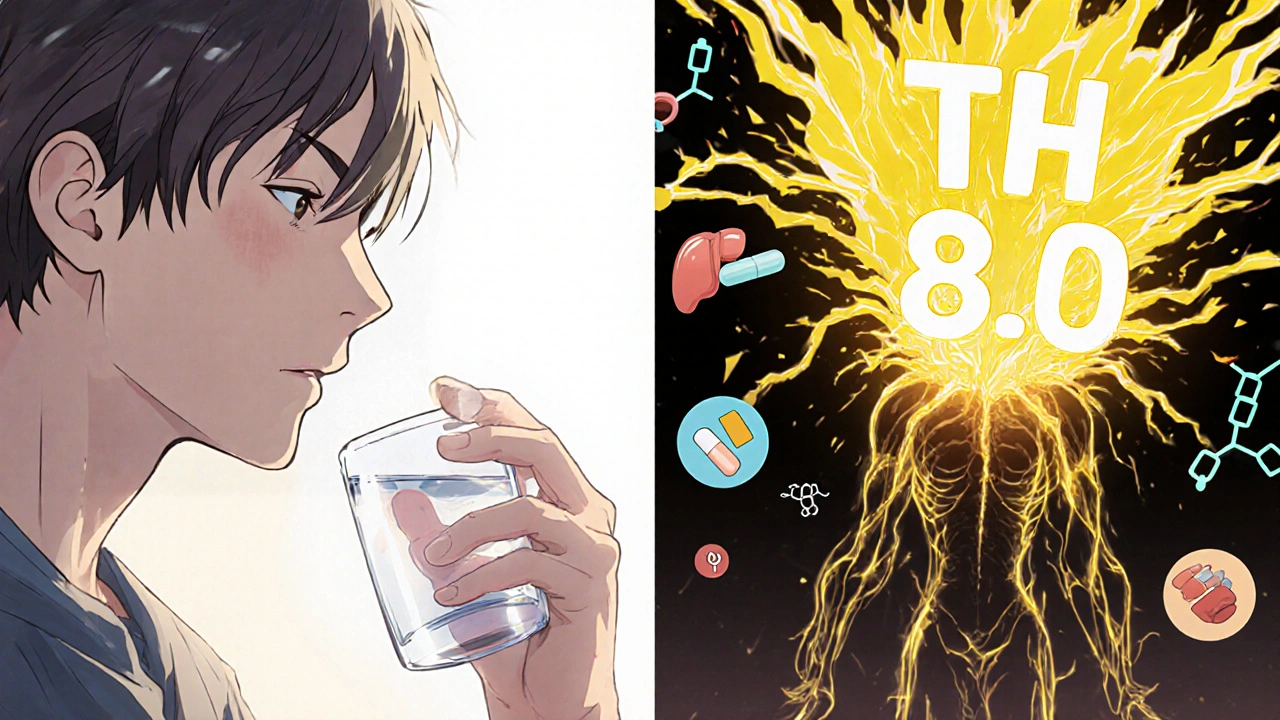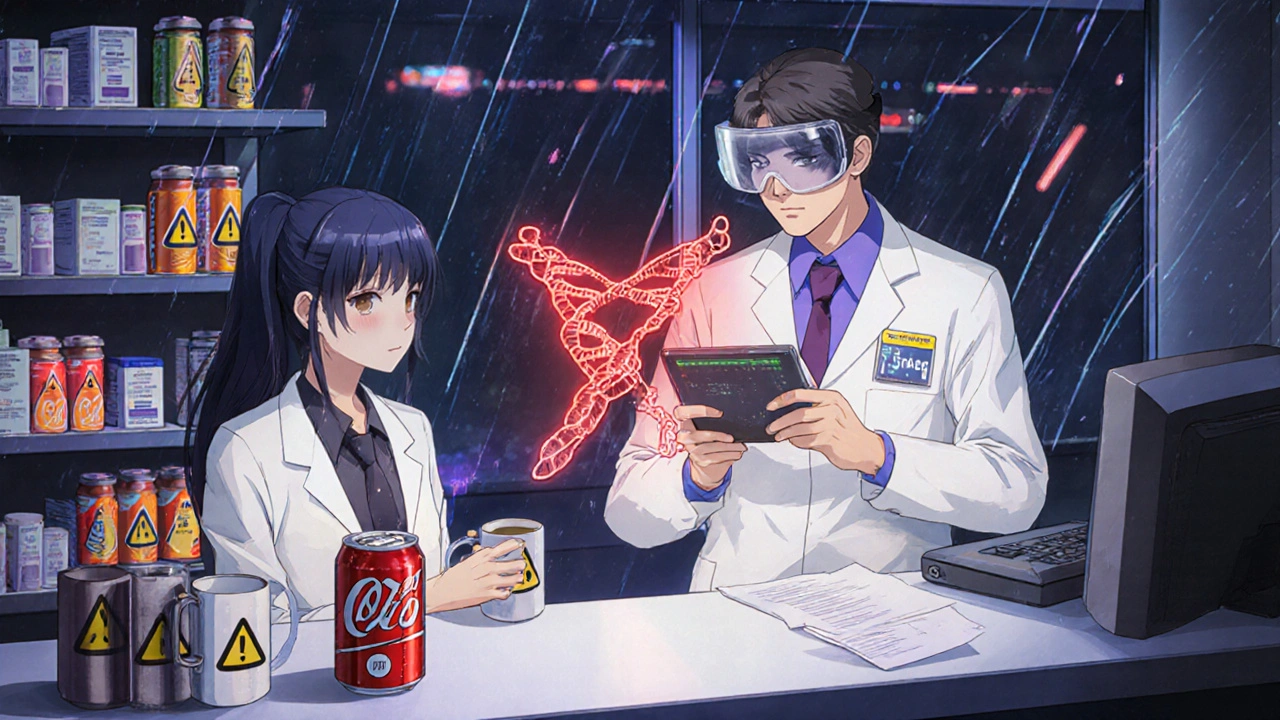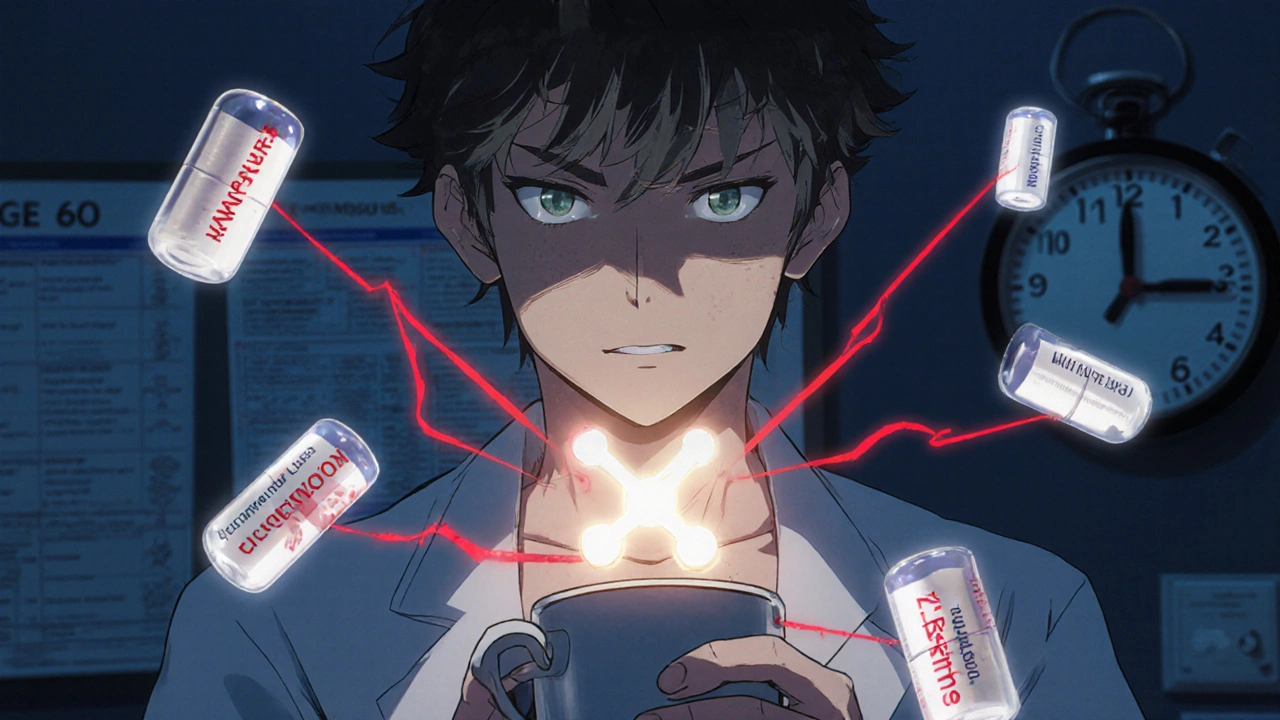Most people don’t think twice about their morning coffee - until they start taking medication and suddenly feel off. Heart racing. Anxiety spiking. Blood pressure climbing. Or worse, their meds stop working. What’s really going on? It’s not just coincidence. Caffeine doesn’t just wake you up - it can interfere with how your body handles prescription and over-the-counter drugs in ways that are serious, common, and often hidden.
How Caffeine Messes With Your Medications
Caffeine isn’t just a stimulant. It’s a chemical that directly interferes with the enzymes in your liver that break down drugs. The main one is CYP1A2 - a protein that handles about 10% of all medications you take. When caffeine blocks this enzyme, your body can’t clear other drugs the way it should. That means levels of those drugs can build up too high, or drop too low - both are dangerous.
It’s not just about coffee. Energy drinks, tea, chocolate, and even some pain relievers contain caffeine. And the amount varies wildly. A cup of brewed coffee? 95-200 mg. A single energy drink? Up to 300 mg. That’s the difference between a mild effect and a medical emergency.
High-Risk Medications You Need to Watch
Some medications are especially sensitive to caffeine. Here are the big ones:
- Warfarin (Coumadin): Caffeine slows down how fast your body breaks down warfarin. That can spike your INR - a measure of how long your blood takes to clot. A rise of 15-25% in INR within 24 hours of drinking coffee is common. That means uncontrolled bleeding risk: nosebleeds, bruising, even internal bleeding. The FDA says patients on warfarin must keep caffeine intake consistent. No sudden increases.
- Levothyroxine (Synthroid): If you take this for hypothyroidism, coffee can block up to 55% of its absorption. One study showed TSH levels jumping from 1.8 to 8.7 in a patient who took their pill with coffee. That’s not just a lab number - it’s fatigue, weight gain, depression, and heart strain. The American Thyroid Association says: wait at least 60 minutes after taking your pill before drinking coffee.
- Theophylline (for asthma): This drug and caffeine are metabolized by the same enzyme. When you drink coffee while on theophylline, your blood levels can rise 15-20%. That’s enough to cause nausea, rapid heartbeat, tremors, or even seizures. Patients on this drug should limit caffeine to under 100 mg per day - about one small coffee.
- SSRIs (like fluoxetine, sertraline): Caffeine can reduce absorption of these antidepressants by up to 33%. That means your anxiety or depression might not improve - not because the drug doesn’t work, but because your body isn’t absorbing enough. Users on Reddit report increased anxiety and brain fog when combining coffee with SSRIs.
- Adenosine and Dipyridamole: These are used in cardiac stress tests. If you’ve had coffee, tea, or energy drinks in the last 24 hours, the test can fail. The drugs lose 70-90% of their effectiveness. You might get sent home, rescheduled, or worse - get a false negative result.
- Verapamil (blood pressure meds): Coffee reduces verapamil’s ability to lower blood pressure by 25-30%. Harvard Health found this happens because caffeine blocks absorption in the gut. If you’re on this drug, drink coffee at least two hours before or after your pill.
- Ephedrine and Pseudoephedrine (cold meds): This combo is a recipe for a dangerous spike in heart rate. One study showed heart rates increasing by 20-30 beats per minute. Combine that with caffeine and you’re at risk for hypertensive crisis - systolic blood pressure rising over 30 mmHg in 68% of cases.

Who’s Most at Risk?
Not everyone reacts the same. Genetics play a huge role. Some people have a fast version of the CYP1A2 enzyme - they burn through caffeine quickly. Others have a slow version - caffeine lingers for hours. If you’re one of those people, even one cup of coffee can cause problems.
Older adults, people with liver disease, and those on five or more medications daily are at higher risk. A 2021 study found patients on polypharmacy were 3.2 times more likely to have a serious interaction. And it’s not just pills - it’s energy drinks. They contain caffeine plus other stimulants like taurine and ginseng, which can add to the risk. The FDA reported a 37% jump in caffeine-related adverse events from 2020 to 2024, with energy drinks behind 68% of serious cases.
Real Stories - What Patients Are Reporting
People aren’t just reading about this - they’re living it.
One Reddit user, ‘ThyroidWarrior2023,’ took levothyroxine with coffee for three weeks. Their TSH jumped from normal to over 8.7. Their endocrinologist confirmed: coffee was the culprit. They switched to taking their pill with water, waited an hour, and their levels returned to normal.
A member of an epilepsy forum, ‘SeizureFree89,’ was on Tegretol (carbamazepine). Their neurologist warned them about caffeine reducing the drug’s effectiveness. They cut back from four coffees a day to one. Within six months, their seizures stopped. No new meds. Just cutting caffeine.
On Drugs.com, over 1,200 users reported interactions between caffeine and antidepressants. 63% said they felt more anxious. 28% said their meds stopped working. These aren’t anecdotes - they’re patterns.

What You Should Do - Simple, Practical Steps
You don’t need to quit coffee. You just need to be smart about it.
- Check your meds. Look at the patient information leaflet. If it says “avoid caffeine” or “may interact,” pay attention.
- Separate your coffee from your pills. For levothyroxine: wait 60 minutes. For verapamil: wait two hours. For warfarin: keep your caffeine intake consistent - no spikes.
- Know your caffeine sources. Coffee isn’t the only one. Tea, chocolate, energy drinks, pre-workout powders, and even some headache pills (like Excedrin) contain caffeine. Read labels.
- Track your symptoms. Did your anxiety get worse after switching to a new coffee brand? Did your blood pressure spike after an energy drink? Write it down. Bring it to your doctor.
- Talk to your pharmacist. They’re trained to spot these interactions. The American Pharmacists Association now requires pharmacists to screen for 17 high-risk caffeine-drug combos during every medication review.
The Bigger Picture
Here’s the scary part: 62% of people who drink caffeine daily don’t know it can interfere with their meds. That’s according to a 2024 JAMA study. Meanwhile, pharmaceutical companies are now putting caffeine interaction warnings on 23% of prescriptions - up from 12% in 2019.
Research is moving fast. The NIH just launched a $4.7 million study to map how genetic differences affect caffeine-warfarin interactions. Hospitals are testing AI tools that flag these risks in electronic records. By 2028, personalized caffeine advice based on your DNA may be standard.
Until then, the safest move is simple: treat caffeine like a drug - because it is. It’s not harmless. It’s not just a morning ritual. It’s a chemical that talks to your pills. And if you’re taking more than one medication, that conversation could be life-or-death.
Can I still drink coffee if I’m on medication?
Yes - but timing matters. For most medications, waiting 60 minutes to two hours after taking your pill before drinking coffee reduces interaction risks. Always check the specific guidance for your drug. Some, like levothyroxine and warfarin, require strict timing. Others, like bupropion, have no known interaction.
Does decaf coffee have caffeine?
Yes. Decaf coffee still contains 2-15 mg of caffeine per cup. That’s not enough to affect most people, but if you’re on a high-risk medication like theophylline or warfarin, even that small amount can add up - especially if you drink multiple cups. If you’re unsure, switch to herbal tea or water around your medication time.
Are energy drinks more dangerous than coffee?
Much more dangerous. Energy drinks often contain 80-300 mg of caffeine per serving - sometimes more than two cups of coffee. They also include other stimulants like taurine, ginseng, and guarana, which can independently affect drug metabolism. The FDA found 68% of serious caffeine-medication interactions involved energy drinks, not coffee.
What should I do if I think caffeine is affecting my medication?
Stop consuming caffeine for 3-5 days and monitor your symptoms. Did your blood pressure drop? Did your mood improve? Did your lab numbers change? Then talk to your doctor or pharmacist. Don’t assume it’s “just in your head.” Caffeine interactions are real, measurable, and often reversible.
Is it safe to drink coffee after taking my morning meds?
It depends on the drug. For thyroid meds, wait 60 minutes. For blood pressure meds like verapamil, wait two hours. For warfarin, keep your daily caffeine intake steady - don’t suddenly drink two extra cups. If you’re unsure, ask your pharmacist. They can tell you the exact window for your specific medication.
Can caffeine make my anxiety worse if I’m on antidepressants?
Yes. Even if caffeine doesn’t lower the drug’s effectiveness, it can worsen side effects like jitteriness, racing thoughts, and insomnia - especially with SSRIs. Many patients report increased anxiety when combining coffee with their antidepressants. Cutting back often helps. Don’t ignore it.


Hi, I'm Caden Lockhart, a pharmaceutical expert with years of experience in the industry. My passion lies in researching and developing new medications, as well as educating others about their proper use and potential side effects. I enjoy writing articles on various diseases, health supplements, and the latest treatment options available. In my free time, I love going on hikes, perusing scientific journals, and capturing the world through my lens. Through my work, I strive to make a positive impact on patients' lives and contribute to the advancement of medical science.